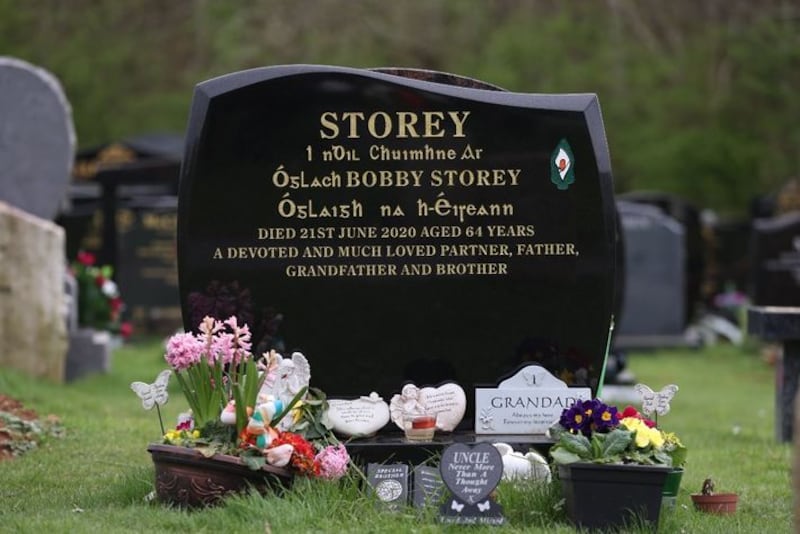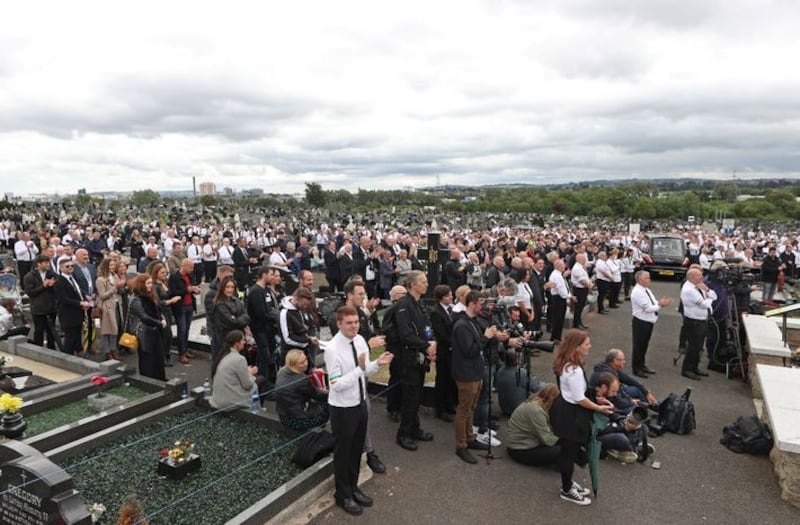Deputy First Minister Michelle O’Neill has again apologised for hurt caused to grieving families over the Bobby Storey funeral as it emerged that the Public Prosecution Service has not recommended the prosecution of any individuals – including Ms O’Neill – for alleged breaches of Covid-19 regulations last year at the funeral.
The Public Prosecution Service considered police evidence files on 24 people and recommended no proscutions. It had been confirmed that all 24 individuals are elected Sinn Féin members.
It is understood that after the PPS considered all the available evidence and advice from senior counsel, it concluded there was no reasonable prospect of a conviction.
Stormont sources said that the evidential test for prosecution was not met, and that therefore the public interest test for prosecution did not apply.
It is understood that the PPS believed the Sinn Féin members would have been able to avail of the reasonable excuse defence if cases were taken to court.
Sources also said that the regulations have changed 10 times since the lockdown laws were introduced last year.
The laws were also changed two days after the funeral, including an amendment on the number of people permitted to attend funerals to bring clarity and consistency.
Sources described the regulations as "unclear and inconsistent", making it difficult for the PPS to bring successful cases to court.
Ms O’Neill was among those interviewed by police over the scenes at Bobby Storey’s funeral in west Belfast in June.
Breaches of Covid-19 regulations are summary offences which are punishable by fines.
It has also emerged that in the week leading up to the funeral, there was a series of engagements between Sinn Féin and senior police.
Police also received a copy of the funeral plans from Sinn Féin days before it took place.
Sources said that the lack of clarity around regulations coupled with the prior engagement between the PSNI and Sinn Féin would pose an "insurmountable difficulty" if any of the reported individuals were prosecuted.
It is also understood that police had a good understanding in advance of the plan for the funeral and that there was general compliance with the plan on the day.
Sources said that when police spoke to the organisers about complying with the regulations, there was no evidence that police suggested that any of the arrangements amounted to a breach.
Following the extent of the talks between the police and funeral organisers, the PPS felt there was a strong argument that those who participated in the plan would have been able to use the reasonable excuse defence in court.
Sources also said that there was significant efforts made by the organisers to ensure that social distancing was maintained and measures put in place minimised the risk of transmission of the virus.
The measures that were put in place were followed by the 24 Sinn Féin members.
It is also understood that the 24 individuals believed they were complying with regulations, which were described as lacking in clarity and coherence.
The funeral of former IRA leader Mr Storey has been one of the most controversial events of the coronavirus pandemic in Northern Ireland.
More than 1,000 people lined the streets for the funeral procession at a time when strict limits on such events were in place.
The attendance of Sinn Féin leaders at the funeral and a subsequent memorial event at nearby Milltown Cemetery sparked a major political row at Stormont, with the republican party accused of disregarding rules they set for the rest of society.
Ms O’Neill, party president Mary Lou McDonald, former president Gerry Adams, Stormont Finance Minister Conor Murphy, TD Pearse Doherty, Policing Board members Gerry Kelly and Linda Dillon, and MLA Martina Anderson were among senior republicans who attended.
It is understood the police files considered by the PPS did not feature individuals resident in the Republic.
Ms O'Neill said this afternoon that she understood many people, particularly those who had lost loved ones during the pandemic, "felt that by my actions, I gave the impression that the rules did not apply to us all equally. Let me say clearly they do".
“No funeral is more important than any other." she said.
"No family or community is any more important than any other. All grief is devastating.
“I wish to say again today that I am sorry for the hurt that has been caused to so many, including to Bobby Storey’s own family who have been thrust into the headlines at a time of immense grief. We wanted only to support Bobby’s family as he was laid to rest.
“Over the past nine months, I have worked tirelessly to rebuild trust with the public and I continue to work every day to navigate us all through this unprecedented crisis."
The attendance of Sinn Féin leaders at the funeral and a subsequent memorial event at nearby Milltown Cemetery sparked a major political row at Stormont, with the republican party accused of disregarding rules they set for the rest of society.

Mr Storey was not buried at Milltown but was instead cremated at Roselawn Cemetery on the other side of Belfast in a separate event which generated its own controversy.
The Police Service of Northern Ireland commissioned Mark Webster, Deputy Chief Constable of Cumbria Police, to oversee its investigation into the events around the funeral.
Commanders sought external direction as those who attended the funeral included Sinn Fein members of the Policing Board, which is the police’s oversight body.
The PPS is also expected to make public decisions over alleged breaches of regulations at three other funerals, including that of former Sinn Fein councillor Francie McNally in Co Tyrone in April 2020.









